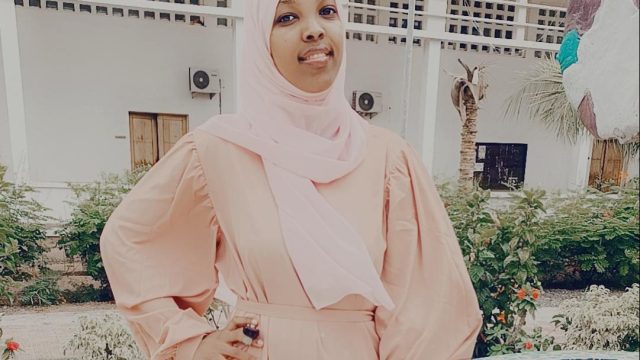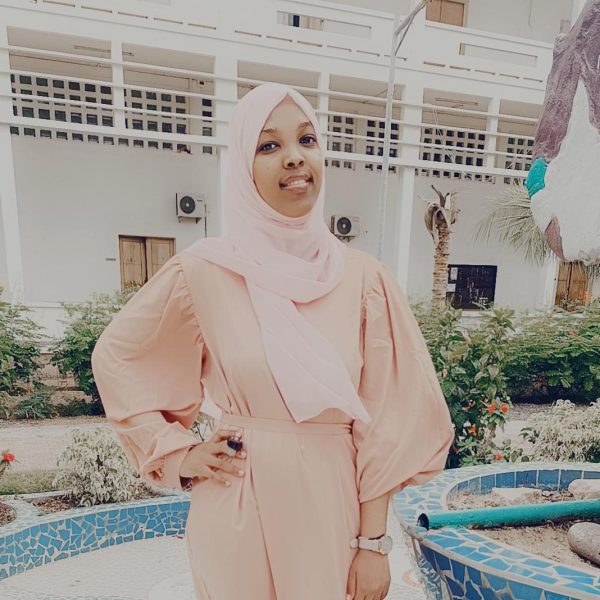
Abroad internship in Senegal – Nasteho’s interview
This summer, discover each week the portrait of our M1 students who are currently on international mobility.
Today it is Nasteho, student in the Information Security course who is doing her mobility at Cheikh Anta Diop University, Dakar (Senegal).
1. What is your background?
My name is Nasteho and I am a student in Master 1 Mathematics and Applications: Information Security – EUR Cryptis. Before this master’s degree, I did a degree in fundamental mathematics at the University of Djibouti.
2. Mobility abroad is compulsory in M1 EUR, were you apprehensive about this mobility?
Yes, I was very apprehensive about this mobility. On the one hand, it’s a wonderful opportunity for discovery and I feel really happy at the idea of being able to have such an experience. However, it is also true that it can be a bit overwhelming, as it involves leaving your living environment and adapting to a new culture and new habits.
3. How did the internship search go and how did you choose your internship location?
The internship search was not easy. Finding an internship can be difficult, but with effort, it can be achieved. I chose Senegal as the destination for my internship because I found a laboratory there that works in my field, related to what I study. After contacting a supervisor among the professors at Cheikh Anta Diop University in Dakar, he responded favorably. So I’m doing my internship there now.
4. What is your internship topic?
The subject of my internship is elliptic encryption and post-quantum encryption.
5. How is the internship going overall?
For our internship, the subject was given while we were still in France. Once we arrived in Senegal, we met with the professor to discuss the internship and how we could address and detail this type of subject.
Since cryptography is our domain, we have many problems to solve. We worked on various aspects, trying to understand and solve specific problems, such as breaking public key cryptosystems with quantum computers. We continue to work on these issues, integrating well with the teams on site to collaborate effectively.
6. What do your internship missions look like?
In the morning, I start at 10 a.m., Senegal time. I show the professor what he asked me and what I found, then we discuss how I can move forward with my work. The professor guides me and gives me directions for the rest of my research and analyses.
7. Do you have a travel story to tell? A culture shock when you arrive?
Arriving in Senegal, one of the first culture shocks I felt was the warm and welcoming manner of the people. An anecdote that comes to mind is the first time I was invited to a traditional Senegalese meal. I was surprised by the friendliness and the way of sharing a large common dish, which is different from what I am used to. This allowed me to better understand and appreciate the local culture.
8. What advice would you give to future students who are going to do their mobility?
- Prepare well in advance: Learn about the host country, local culture, administrative formalities and practical aspects of daily life. Good preparation in advance can make the adaptation much smoother and more pleasant.
- Be open-minded: Adapt to the new cultures and traditions you discover. This will not only allow you to integrate better, but also enrich your own vision of the world.
- Learn the local language: Even if you’re not fluent, make an effort to learn a few words and expressions. This shows your respect for the local culture and makes everyday interactions easier.
- Network: Take the time to meet local people, colleagues and other students. These relationships can be valuable to your social well-being and academic success.
- Be organized: Manage your schedule efficiently between studies, work and leisure activities. Good organization will allow you to fully enjoy your stay while maintaining a good life balance.
- Explore the country: Take advantage of every free moment to explore the different regions of the country, discover its cultural diversity, its magnificent landscapes and its local traditions.
- Stay in touch: Maintain contact with family and close friends. They will be your moral and emotional support from a distance.
- Be resilient: Faced with challenges and unexpected events, keep a positive attitude and learn from the difficulties encountered. Resilience will help you overcome obstacles and grow personally.

